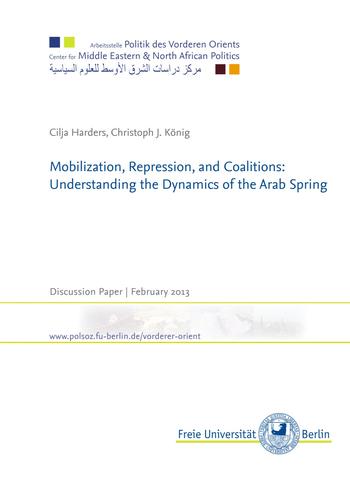Discussion Paper: Mobilization, Repression, and Coalitions: Understanding the Dynamics of the Arab Spring
Cilja Harders, Christoph J. König – 2013
In this article, we begin with the puzzle of how the 2011 mass mobilizations in Egypt, Bahrain, Tunisia, Libya, Syria, and Yemen could happen, and how they could be sustained in some cases but not in others. The grievances of Arab societies caused by the lingering political, social, and economic crises, which are highlighted in many accounts of the Arab uprisings, have been well known for more than a decade. We hold that these “old crises” cannot account for the wave of “new protests,” and structuralist approaches, which focus on regime stability or changes in political opportunity structures, cannot sufficiently account for these major events. In light of quite stable political opportunity structures, we argue that specific actors and their choices provide the answer to the puzzle. They are crucial in order to account for the variations in degree, trajectory, and outcome of mobilization observed since the spring of 2011. We propose studying antiregime coalitions, in particular their framing activities and their dynamic interactions with various agents of repression, as key to understanding the success or failure of mass mobilization in authoritarian contexts. Building on the quite different cases of Egypt and Bahrain, we show the ways in which similar conflict dynamics set in motion by antiregime coalitions can play out differently. We argue that both the choice to violently repress protest and the choice by anti-regime activists to escalate protests sometimes backfire. The contingencies of revolutionary trajectories derive in large part from such unintended effects. By closely tracing the situational interaction dynamics with our proposed analytical focus and concepts, the empirical investigation can account for some of these contingencies, which were crucial to the outcomes of the respective episodes of mass mobilization.
